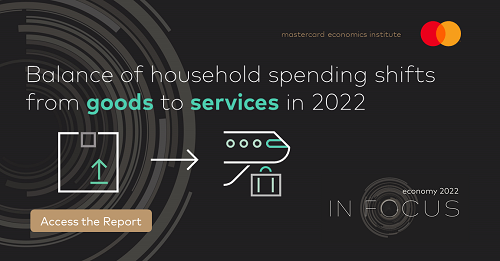Mastercard Economics Institute: 2022 Economic Outlook Defined by Digital Resilience and a Return to the ‘Experience Economy’
- Publish date :
Thursday - am 12:00 | 2021-12-09
Alanbatnews -
•Shifts in household savings, economic growth and consumer spending on "stuff” vs. "experiences” are in focus as businesses continue to move digital
•Global economic outlook report was launched at Expo 2020 Dubai, where 192 countries are currently participating in the world expo
Amman, Jordan; December 9, 2021: Ahead of the pandemic’s second year milestone, the Mastercard Economics Institute released today Economy 2022, a global outlook for the coming year based on critical trends as seen through the lens of the consumer.
The report reveals how five fundamental factors — savings and spending, supply chains, digital acceleration, global travel, and a growing list of economic risks — will continue to shape the global economy.
Our key findings include:
•Savings & Spending*: Consumer spending of built-up savings could contribute an additional three percentage points to global GDP growth in 2022. Household saving rates nearly doubled in 2021. How quickly or slowly consumers spend from their savings will have a ripple effect on the global economy.
•Supply Chains: A record-breaking 27-year rewind in the household spending shift from goods to services rotates back – already six percentage points below the peak. The pandemic sparked spending growth on goods from 39% to around 47% at its peak, roiling the services economy while burdening supply chains. With cupboards bursting, we expect the balance to normalize in 2022 as borders open and services become more accessible and desirable again.
•Digital: 20% of the digital shift in retail stays put – reshaping how and what consumers buy. E-commerce subscriptions gained traction in 2021 as nearly 88% of countries across 32 markets saw a surge in subscription services compared to the previous year. Notably, car companies, virtual workout partners, bike rentals and pet services are among a slew of businesses benefitting from this model.
•Travel: Leisure travel recovery continues as international travel opens up, with medium- and long-haul flights to gain ground in 2022. The return to travel in 2021 was on full display on our roadways and in airports, but continued growth hinges on containing virus variants that drive travel bans. We saw a swift rebound in domestic and short-haul international travel (under 1,000 km), medium-haul travel (under 2,900 km) lifted by fewer restrictions, while long-haul travel trails behind.
•Risks: Risks remain with the potential to disrupt the global economy. New COVID variants like Omicron pose the biggest immediate risk, but we’re keeping an eye on nearly a dozen additional risks that have the potential to derail recovery, including a sharp recalibration of housing prices that have appreciated 66% over the past two years, a surge in oil prices, fiscal cliffs in advanced economies, and international tariff wars.
"The past year was not the return to normal that many yearned for, but collectively, we have made tremendous progress,” said Bricklin Dwyer, Mastercard chief economist and head of the Mastercard Economics Institute. "Globally, economic growth, vaccine advances, and digital transformations that have made businesses large and small more resilient, continue to shape the future. It is against this backdrop that we anticipate consumer demand — and spending power — to grow and the experience economy to reemerge next year.”
*Methodology
The Mastercard Economics Institute draws on aggregated and anonymized sales activity in the Mastercard network among other sources to develop a measure of the quantity and prices of goods vs services consumed for economies throughout the world.
You can view the full Economy 2022 outlook here. This is the third outlook report from the Economics Institute; other reports can be found here.
###
Disclaimer
This presentation and content are intended solely as a research tool for informational purposes and not as investment advice or recommendations for any particular action or investment and should not be relied upon, in whole or in part, as the basis for decision-making or investment purposes. This presentation and content are not guaranteed as to accuracy and are provided on an "as is" basis to authorized users, who review and use this information at their own risk. This presentation and content, including estimated economic forecasts, simulations or scenarios from the Mastercard Economics Institute, do not in any way reflect expectations for (or actual) Mastercard operational or financial performance.
About Mastercard Economics Institute
Mastercard Economics Institute launched in 2020 to analyze macroeconomic trends through the lens of the consumer. A team of economists, analysts and data scientists draws on Mastercard insights - including Mastercard SpendingPulse™ - and third-party data to deliver regular reporting on economic issues for key customers, partners and policymakers.
About Mastercard (NYSE:MA)
Mastercard is a global technology company in the payments industry. Our mission is to connect and power an inclusive, digital economy that benefits everyone, everywhere by making transactions safe, simple, smart and accessible. Using secure data and networks, partnerships and passion, our innovations and solutions help individuals, financial institutions, governments and businesses realize their greatest potential. Our decency quotient, or DQ, drives our culture and everything we do inside and outside of our company. With connections across more than 210 countries and territories, we are building a sustainable world that unlocks priceless possibilities for all. www.mastercard.com
Mastercard Communications Contact: Baiba.Upmale@mastercard.com

